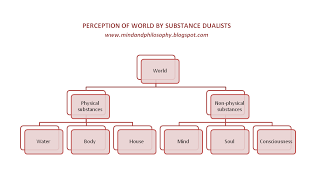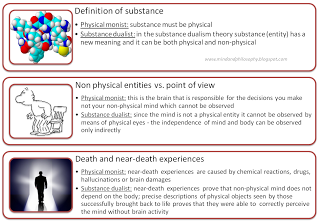Philosophy
- Descartes, Dualism And Monism
Let?s assume that both you and me do have minds; I guess it would be way easier to think this post over if you had some free mind to use. Otherwise the idea of thought without a mind might get a little bit tricky ? but as you?re about to see, thought...
- Substance Dualism
Although most philosophers of mind are probably physicalists, there is still a live debate about the ontological status of mind: is it physical or immaterial? On one side of the debate are those who argue that thoughts are not physical, and therefore...
- Lecture 4 - Cartesian Dualism & The Mind-body Problem
There are all sorts of psychological reasons why people tend to believe that we have an immaterial soul that can somehow overcome the physical limitations of the body (think out-of-body experiences, misinterpretation of brain quirks and our tendency for...
- Substance Dualism
If you believe that, in the ultimate analysis, you are a combination of a physical body and a non-physical soul, then you would be a substance dualist. This tradition has been around for thousands of years, and has been espoused by thinkers as prominent...
- John Searle - Beyond Dualism
Descartes' philosophical articulation and defense of psycho-physical dualism (the idea that the mind has an existence different and independent from the physical body), and the idea that the mind cannot be reduced to simple physical processes, have...
Philosophy
Physical monism vs. substance dualism - arguments
In the last post we?ve been dealing generally with the differences between the two major schools which are monism and dualism. It?s time we take a closer look to one of the most popular branches of the dualism ? substance dualism. It states that there are two completely different substances (entities) ? mental and material. This used to be one of the most popular theories in the times of Descartes ? nowadays, however, as the science progresses it seems that it's becoming more and more difficult to defend such a controversial view. Why is it so?
 |
| Perception of world by substance dualists |
To my mind, the biggest problem in understanding the concept of the theory is the definition of substances which turns out to be quite misleading. While we?re usually sure what the physical substance is, many of us get lost when it comes to explaining the non-physical entity. The word ?substance? means that something must be physical, whereas substance dualists argue that the world we live in consists of physical substance (which could be actually regarded as a pleonasm) and non-physical substance (which seems to be a paradox). Such a great confusion in the very definition of the philosophical theory may cause the whole theory to be unclear and tricky. Some dualists compare non-physical substance to wind, music, or energy; however, these comparisons are the source of even greater confusion. All of these examples are strictly physical ? wind and music consist of waves which can be heard, felt, and with the use of scientific apparatus you?re even able to see them. Personally, I believe that a much better term would be simply a form, which does not suggest that it needs to be physical.
Physical monists argue that substance dualists actually confuse physical and non-physical substances (entities, forms, or whatever you want to call them) with the point of view. While reading this blog, you?re probably sitting on the chair (or lying in the bed) ? if you?re a healthy person you will, sooner or later, stand up. You?ll think that you want to stand up, you?ll make your decision, and as you?ll be standing up, you?ll feel how it is like to stand up. That?s at least your perspective. Now imagine you?re a scientist with all the advanced apparatus which enables you to see the inside of a body. What would you observe? You would probably see that there is a brain activity in the part of the brain which is responsible for decision making. Then you would observe a nerve activity, and subsequently a muscle activity causing the reader of this blog to stand up. You as a scientist would not be able to observe the feeling of how it is like to stand up, and you would not be able to observe the cause of such a brain activity. But does it really mean that if these aspects of standing up can?t be observed they don?t exist? This is a monist point of view; I think that since, according to the substance dualism, world is built of physical and non-physical entities there is in fact no way of directly observingthe non-physical entities. They are manifestedin physical entities but as such can?t be observed. I believe that this is why one?s personality often changes when the brain is damaged. Non-physical part of your body cannot manifest through the damaged physical body. It doesn?t mean, however, that a damaged body kills the non-physical entity.
 |
| Brief summary of arguments |
If the non-physical part of the body can?t be observed directly how can it be observed at all? The only possible way of proving the existence of the non-physical entity is to show the independence of the two body parts. I think that the only way to show this independence is to find a situation in which mind exists independently outside the body. Obviously, there are not many opportunities (if any) to prove the mind-body independence. Maybe with one exception only ? death and near-death experiences. There are numerous cases of patients who were clinically dead; and despite being clinically dead they were able to hear and see outside their bodies (this is called an out-of-body-experience - OBE). Many patients who were successfully brought back to life were able to precisely describe what doctors did, said, and so on (one of the well known cases is the one of Pam Reynolds who precisely described the drill which the doctor used to open her skull even though she hadn?t seen it before). If you?re interested in death and near-death experiences I recommend you a wonderful book I read many years ago ? ?Back and Beyond? by R. Wilkerson. From these near-death experiences you can deduce that there are both physical and non-physical side of the human being and that the latter can exist without its physical part. I think these experiences can?t be explained by hallucinations if they actually reflect the reality (as in the case of the drill seen by Pam Reynolds).
I believe that there are some flaws in the substance dualism (the main one is the definition of substances) but all in all science (especially near-death experiences) can help to prove the theory right. The biggest mistake of many monists is that they in fact want a physical proof for non-physical substance which is as self-contradictory as the misleading use of the word substance in the substance dualism theory (this type of misleading use of words is called equivocation). That?s how I see it ? I?d love to hear your opinions and arguments too, so please do take time to leave a comment!
- Descartes, Dualism And Monism
Let?s assume that both you and me do have minds; I guess it would be way easier to think this post over if you had some free mind to use. Otherwise the idea of thought without a mind might get a little bit tricky ? but as you?re about to see, thought...
- Substance Dualism
Although most philosophers of mind are probably physicalists, there is still a live debate about the ontological status of mind: is it physical or immaterial? On one side of the debate are those who argue that thoughts are not physical, and therefore...
- Lecture 4 - Cartesian Dualism & The Mind-body Problem
There are all sorts of psychological reasons why people tend to believe that we have an immaterial soul that can somehow overcome the physical limitations of the body (think out-of-body experiences, misinterpretation of brain quirks and our tendency for...
- Substance Dualism
If you believe that, in the ultimate analysis, you are a combination of a physical body and a non-physical soul, then you would be a substance dualist. This tradition has been around for thousands of years, and has been espoused by thinkers as prominent...
- John Searle - Beyond Dualism
Descartes' philosophical articulation and defense of psycho-physical dualism (the idea that the mind has an existence different and independent from the physical body), and the idea that the mind cannot be reduced to simple physical processes, have...
